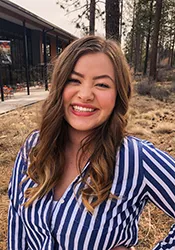The John R. Keys Fellowship
The 2025/2026 fellowship will open for applications fall 2025.
DEADLINE: 11/01/2025
Purpose
The goal of this fellowship is to support faculty-mentored student research that meets the mandate of the Laboratory for the American Conversation (LAC). The research fellowship is an opportunity for a student to engage in ongoing, faculty-approved research affiliated with the LAC.
Source of Support
This program is made possible due to the generous support of the John R. Keys family.
Awards
A student fellow will receive a stipend of up to $1500 per annum. The faculty mentor has discretion over the budget and is expected to submit a budget for approval by the LAC administration. Budget items may include stipends for faculty and other direct research costs. The LAC administrators will announce annually the amount of funds available for awards, based on the amount of income generated by the John R. Keys Fellowship endowment. Awards are made annually after approval by the Lab’s Advisory Council. Any unused funds will be returned to the Fellowship Program to support future awards.
Application Process
The application narrative is limited to one page. The objective is to identify students with potential in the fields of public health, social science, consensus building, or marketing and communications.
Students submit:
- a 1-page (maximum) description of their applicable skills and interest in research and the laboratory; and
- a resume/CV, which includes previous research experiences and courses taken that are research oriented.
Faculty mentors submit:
- An itemized budget; and
- A timeline for the project, not to exceed one year.
Please email all inquiries and applications to: chris.wolsko@osucascades.edu
Requirements
Eligible faculty members will have an affiliation with the Laboratory for the American Conversation and have existing research or projects affiliated with the Lab. Eligible students will be enrolled in either undergraduate or graduate programs.
Past Fellows
Aura Thomas-Sargent
2021-2022 John R. Keys Fellow

I plan to graduate in 2025 from the Honors College with a major in political science (law and politics focus) and minors in French and psychology. I'm originally from Fayetteville, Arkansas, but am now proud to call Oregon home. I am passionate about law, environmental justice, and political psychology, but also language, art, music and so much more! After graduation, I plan to go on to get my J.D. in environmental or human rights law, both to gain essential legal skills and also to further my scholarship in subjects such as sustainability, justice, culture and the law.
I would like to emphasize my sincerest gratitude to the Keys family and the LAC for the John R. Keys Fellowship and the opportunity to work in the Lab. My research on water rights in the Deschutes has helped me develop new understandings of stakeholder interactions and communications surrounding non-excludable common pool resources. This work and incredible learning experience has inspired me to further my research in areas like environmental politics, psychology and conflict resolution.
Jade Warner
2020/2021 John R. Keys Fellow

I graduated spring 2021 from the Honors College with a major in social science, on the community development and leadership track, and with a minor in political science. I am originally from Portland, Oregon. My passion lies in public policy, advocacy, and politics. Upon graduation, I hope to continue to do work engaging with the community through advocacy and political action. I aim to get my master’s degree in public policy in order to work toward an Oregon that works for all of us.
I am incredibly grateful to the Keys Family and the Laboratory for the American Conversation for the John R. Keys Fellowship and the opportunity to work with the LAC. My work at the LAC has enabled me to better understand the values and perspectives across the political spectrum, so that we can hold productive policy conversations and better support the needs of all people in our communities. The work at the LAC has also inspired my Honors College thesis, which looked at political divisiveness as it relates to COVID-19 and vaccines.